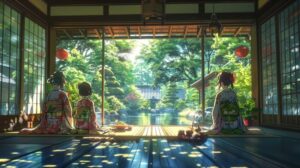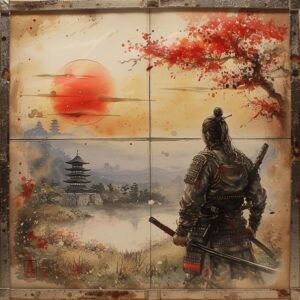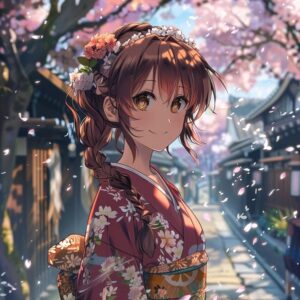
In the heart of Japanese culture lies the cherished saying, “Ichi-go ichi-e,” a reminder to treasure every moment as a unique, once-in-a-lifetime encounter. This ethos, while deeply personal, also opens a window into understanding the diverse world of anime.
Anime transcends mere entertainment, blending Japanese traditions and cultural messages into its narratives. Platforms like Anime Ape also reflect this diversity, offering insights into the many genres and themes that make anime such a powerful expression of culture.
Yet, the beauty of anime lies in its subjectivity—the stories come alive uniquely within each viewer, colored by their own emotions and perspective.
As we explore the various types of anime, we’ll see how these animated forms invite us to interpret and connect with the ground postulates of Japanese culture in our own distinctive ways.
-
The Value of Friendship and Perseverance: Naruto
Naruto Uzumaki’s journey alongside Sasuke Uchiha and others in “Naruto” illustrates the power of friendship, perseverance, and the pursuit of dreams.
This theme resonates deeply with the Japanese value of “wa” (harmony), emphasizing group cohesion and loyalty. Naruto’s relentless effort to bring Sasuke back to the village mirrors the historical samurai loyalty to their comrades and lords, showcasing the depth of dedication and the spirit of never giving up deeply ingrained in Japanese culture.
This persistence is reflected in the Japanese proverb “Nana korobi, ya oki” (“Fall seven times and stand up eight”), encapsulating the essence of resilience and determination that Naruto embodies. The series itself, rich in ninja lore and the concept of “jutsu” (techniques), draws heavily on Japanese mythology and martial arts, presenting a fantastical yet deeply cultural narrative.
-
Facing the Past to Forge the Future: Attack on Titan
“Attack on Titan” unveils the brutal truth that confronting and understanding our history is crucial for progress. This mirrors Japan’s post-World War II reflection and growth.
The anime’s determined Titans and the walls symbolize the challenges and barriers societies face, urging a look beyond immediate fears to address historical wounds and learn from them, a lesson deeply rooted in the post-war reconstruction of Japan.
The series serves as a metaphor for the walls we build around our nations and hearts and the giants we must face to move forward.
It resonates with the Japanese concept of “mottainai,” a sense of regret concerning waste, which in this context applies to the waste of not learning from past mistakes and tragedies.
-
The Journey to Self-Discovery: Afro Samurai

“Afro Samurai” tells the tale of a lone warrior’s quest for revenge and self-discovery in a feudal yet futuristic world. This journey mirrors the samurai’s path of self-discipline, the search for meaning beyond material success, and the essence of “bushido” (the way of the warrior).
In the cartoon Afro Samurai, the main character, Afro, has a special version of the Taichi sword. He uses it to fight very fast and hard to get revenge, which is very different from how it’s used in real Taichi. In reality, people who do Taichi Chuan, a slow and gentle exercise, use this sword to make smooth and flowing movements. Learn more about Japanese swords and more at SamuraiSwordStore.
It reflects on the historical conflicts within Japan and the inner battles individuals face, emphasizing the importance of personal growth and understanding one’s identity.
This quest is underscored by the principle of “satori,” the Zen Buddhist idea of sudden enlightenment, which Afro seeks through his battles, symbolizing the struggle for internal clarity and peace amidst the chaos.
-
Morality vs. Justice: Death Note
“Death Note,” features the strategic battles between Light Yagami and L, with the god of death (Shinigami) Ryuk lurking in the background. It delves into the complexities of morality, justice, and the consequences of absolute power.
This anime reflects Japan’s historical shifts in governance and law, exploring the fine line between righteousness and tyranny and the philosophical debates that have shaped Japanese society’s moral compass.
The narrative echoes the Japanese concept of “Giri” (duty and obligation) versus “Ninjo” (human feelings), as Light struggles with his sense of justice against his growing despotism, encapsulating the conflict between societal expectations and personal desires.
“Death Note” not only offers a thrilling psychological battle captivating audiences with its intensity.
It also serves as a cautionary tale about the dangers of unchecked power, echoing historical lessons from Japan’s own journey through periods of strict governance and the quest for a balanced moral framework.
-
The Strength Found in Diversity: One Piece
“One Piece” celebrates the strength and potential of diversity through the Straw Hat Pirates’ adventures.

Each crew member’s unique abilities and backgrounds contribute to their collective success, symbolizing not only Japan’s historical port cities like Nagasaki and Yokohama, which flourished through embracing foreign influence, but also the deep-rooted Japanese value of “Yujo” (friendship).
The bonds formed between the crew transcend their differences, embodying the spirit of mutual respect and understanding.
Their journey across the Grand Line in search of the titular treasure is a testament to the power of friendship and the belief that true wealth lies in the relationships we build and the adventures we share, mirroring the communal ethos and the adventurous spirit celebrated in Japanese culture.
-
Embracing One’s True Nature: Tokyo Ghoul
“Tokyo Ghoul” explores the themes of identity and acceptance through Ken Kaneki’s transformation into a ghoul.
This anime mirrors Japan’s historical periods of social stratification and the ongoing struggle for the acceptance of marginalized groups.
It challenges viewers to consider the importance of empathy and understanding, urging reconciliation with one’s inner self and society, a lesson that resonates with the Japanese principle of coexistence.
The journey of Kaneki is a poignant reflection of “Mono no aware,” the pathos of things, a sensitivity to the ephemeral beauty of being, and the serene acceptance of the fleeting nature of life and identity. “Tokyo Ghoul” not only delves into the dark recesses of societal division but also illuminates the potential for harmony through understanding and embracing one’s nature.
-
Accepting Change and Letting Go: AnoHana: The Flower We Saw That Day

“AnoHana: The Flower We Saw That Day” deals with themes of grief, reconciliation, and the importance of moving forward.
This narrative mirrors the Japanese cultural and historical context of dealing with loss and change, especially in the aftermath of events such as natural disasters and the rapid modernization of society.
It teaches the lesson of accepting change and the importance of letting go, which aligns with the Buddhist concepts of impermanence and detachment prevalent in Japanese thought.
-
Rediscovering Connection in Isolation: Ergo Proxy
“Ergo Proxy” delves into a dystopian future where humanity resides in domed cities, isolated from a devastated world outside, a premise that echoes Japan’s periods of self-imposed isolation, such as the Sakoku policy of the Edo period.
Within this setting, the series explores profound themes of existential dread, identity, and the search for truth in a society where reality is manufactured and surveillance is omnipresent.
This narrative reflects on the Japanese concept of “uchi-soto” (inside-outside), highlighting the tension between the individual’s inner world and societal roles, along with the longing for authentic connections amidst widespread alienation.
The protagonists’ journey through the desolate landscapes outside the domes symbolizes a quest to rediscover a lost harmony with the natural world, challenging the sustainability of a technologically dependent existence.
-
The Sacrifice for Peace: Fullmetal Alchemist: Brotherhood
“Fullmetal Alchemist: Brotherhood” explores the high costs of war and the sacrifices required for peace. This theme is deeply relevant to Japan’s history, particularly its post-World War II pacifism and the constitution renouncing war.
The Elric brothers’ journey emphasizes the importance of understanding and accepting the consequences of one’s actions, reflecting on the sacrifices Japan made for reconstruction and peace.
The anime intricately weaves the concept of “kintsugi,” the art of repairing broken things with gold, into its narrative, symbolizing the beauty and strength found in embracing flaws and healing.
“Fullmetal Alchemist: Brotherhood” not only addresses the physical and moral devastations of conflict but also offers a hopeful perspective on rebuilding and achieving peace.
It mirrors Japan’s own path towards recovery and the enduring commitment to peace and harmony in the aftermath of rage.
-
Mother Nature: Our Truest Guardian in “Princess Mononoke”
“Princess Mononoke” masterfully underscores the profound truth that Mother Nature is our ultimate guardian, a theme deeply woven into the fabric of Shinto beliefs, where the divine essence infuses all natural forms.
Through the narrative of Ashitaka, caught in the crossfire between human ambition and the ancient spirits of the forest, the film illuminates the dire consequences of straying from our intrinsic bond with the Earth.
Emphasizing the principle of living in harmony with the environment reveals the potential for reconciliation and healing in the face of discord sown by human indifference.
The film’s portrayal of rural Japan and the magical connection between the characters and their natural environment harks back to a time before industrialization, advocating for a balanced and respectful coexistence with the earth.

This relationship with nature is deeply embedded in Japanese aesthetics, particularly the concept of “satoyama,” the borderlands between village and wilderness, where humans and nature interact harmoniously.
A Final Message
Anime captivates audiences worldwide with its vast range, from the darkest dystopian underbelly and futuristic apocalyptic cities to enchanting magical forests and beyond.
These stories stretch the imagination, pulling us into worlds where every frame and storyline reverberates with the depth of human emotion and the intricate tapestry of Japanese culture.
In its essence, anime offers a unique lens through which we explore the complexities of life, society, and nature itself.






